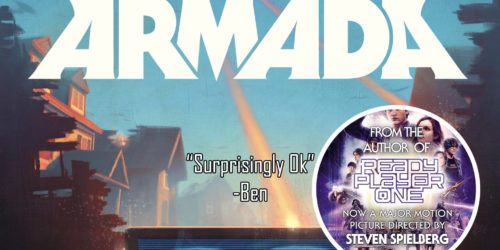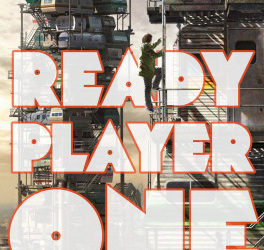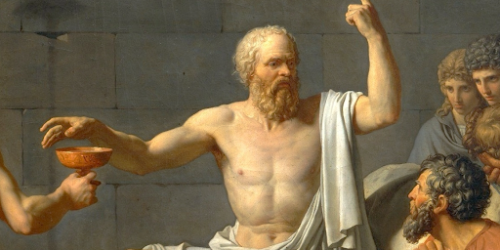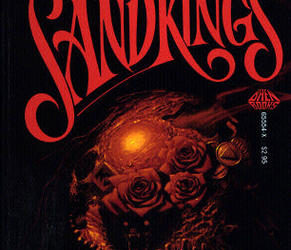Ben’s Honest Thoughts on Ready Player Two by Ernest Cline
We recently covered Ready Player Two by Ernest Cline on the podcast. These were some of the longest recording sessions that we’ve done. They were also some of the most frustrating. Both Nate and I had a lot to say. I think that Nate would agree that either of us could have done a three hour monologue on the book. However, I think Nate would disagree with my opinion that this makes it an interesting book to talk about.
In this post, I would like to offer my genuine thoughts on the text. I will not be making jokes. I simply want to explain to the reader, and perhaps myself, why these books live rent free in my head.
Ready Player Two is a book that, for me, is very closely tied to its author. I don’t have any strong feelings about “death of the author” in general. Sometimes I’m able to separate the art from the artist, other times not so much. With the Ready Player One series, the shadow of Ernest Cline looms too large to ignore.
Ernest Cline has four major writing credits to his name at the time of this blog’s writing.
- The screenplay for Fanboys, a film in about a group of friends who are die hard Star Wars fans trying to break into Skywalker Ranch to steal a rough cut of The Phantom Menace because one of the group has terminal cancer and will not live long enough to see the film released.
- Ready Player One, a book about a dystopian future in which the vast majority of humanity lives out their lives in a VR world called The Oasis. The main characters become obsessed with 1980’s geek culture in order to find secret keys left behind by The Oasis’s Willy Wonka-esque creator. The person who finds all three keys will be rewarded with ownership of The Oasis and it’s late owner’s vast fortune.
- Armada, a rip off of The Last Starfighter. It’s ok, though because the main character has seen The Last Starfighter and references it in the book.
- Ready Player Two, a sequel to Ready Player One in which our characters have to engage in another Easter egg hunt but this time to the death. Ready Player Two introduces a new brain-machine interface that allows one to experience The Oasis as one would experience reality.
“Geek Culture” is at the forefront of Ernest Cline’s entire body of work. On it’s own that wouldn’t be a problem. There are several ways to make any topic that a person is passionate about interesting to a general audience. I have read stories about camping, mountain climbing, baseball, and half a dozen other hobbies that I have absolutely no interest in. Many of these stories have captivated me by making the story about its characters and their humanity rather than the events of the plot.
For example, I don’t need to have an interest in baseball statistics to understand Peter Brand’s struggle to convince a major league franchise to use his statistics-based team building strategy in the movie Moneyball. I see how important it is to the character. I relate to that character. I too know what it’s like to be ignored when I’ve worked really hard on something. A good writer sees this story that is, on the surface, about baseball and finds a way to make it about people. Through this human story, I am able to see the game of baseball with new eyes. I’m able to understand why people love it even I do not.
I also want to thank all of the writers, filmmakers, actors, musicians, programmers, game designers, and geeks whose work I’ve paid tribute to in this book. These people have all entertained and enlightened me, and I hope that this story will inspire others to seek out their creations.
Cline, Ernest. Ready Player Two (Ready Player One) (p. 370). Random House Publishing Group. Kindle Edition.
The above quote comes from the acknowledgement section of Ready Player Two. It indicates to me that Ernest Cline may think that what he has done with this novel is “paid tribute” to the geek culture that he loves. He believes that he has achieved something akin to what Bennett Miller, Steven Zaillian, Aaron Sorkin, and Michael Lewis did with Moneyball. Perhaps through Cline’s story, he will allow you to see these works as he sees them. He will help you to see why people love them even if you do not. This is not the case.
As a tribute, Ready Player Two, is an abject failure. I want to share a few quotes from Moneyball. The purpose of these quotes within the film is to quickly articulate to a general audience what the characters are doing, how the characters feel, and what their personal stake in the plot is.
Your goal shouldn’t be to buy players. Your goal should be to buy wins. In order to buy wins, you need to buy runs.
Money Ball, dir. Bennett Miller, 2011
It’s about getting things down to one number. Using the stats the way we read them, we’ll find value in players that no one else can see.
Money Ball, dir. Bennett Miller, 2011
If we win—on our budget with this team—we’ll change the game. And that’s what I want, I want it to mean something.
Money Ball, dir. Bennett Miller, 2011
Now I would like to share with you a few quotes from Ready Player Two that are positioned at relatively the same point where an author should be making sure the general audience is clear on the plan, the motivation, and the stakes.
“I’ve got one of our chief engineers on the phone right now,” he announced. “And he can’t figure out a way to unlock his vault either. According to him, the firmware on our OIVs has not been altered in any way—it just isn’t functioning properly now, due to the changes in Anorak’s infirmware.” Faisal threw up his hands in a helpless gesture. “We won’t be able to attempt a lobo logout. Even as a last resort.”
Cline, Ernest. Ready Player Two (Ready Player One) (p. 139). Random House Publishing Group. Kindle Edition.
A “lobo logout” was the slang term for what happened when someone’s ONI headset malfunctioned or lost power before their OASIS logout sequence could be completed and their brain was properly awakened from its dreamlike state. Nine times out of ten, a lobo logout left the wearer in a permanent coma. But a few hardy souls managed to wake up and recover their faculties, the way some people were able to bounce back after a major stroke. Several of these survivors described being trapped in an endless loop of the final second of the simulation they were experiencing before they lost their connection. A loop that seemed to stretch on for months or years. (GSS never allowed the public to find out about that last bit, though.)
One night, we decided that “Space Age Love Song” by A Flock of Seagulls was our song, and then we listened to it over and over again, for hours, while we talked or made love. Now I couldn’t stand to hear that song anymore. I had it filtered out in my OASIS settings, to ensure that I never heard it again.
Cline, Ernest. Ready Player Two (Ready Player One) (p. 34). Random House Publishing Group. Kindle Edition.
We kept jogging down Shermer Road, Art3mis in the lead, until we triggered another needle drop—“It’s All in the Game” by Carmel, another track off the She’s Having a Baby soundtrack. Upon hearing it, Art3mis skidded to an abrupt halt. Then she turned around and startled all of us, by singing along with the song’s opening lyrics in perfect harmony.
Cline, Ernest. Ready Player Two (Ready Player One) (p. 185). Random House Publishing Group. Kindle Edition.
“Many a tear has to fall, it’s all…a game,” she sang. “Life is a wonderful game, we play and play….”
This is cherry picking, but even the most charitable analyst is going to struggle to find an example in Cline’s work that describes a human emotion in a way that isn’t blunt, wordy, and filled with even more references that lack context and explanation. If you have not heard the song “Space Age Love Song” then you have no idea what this means to the characters in question. If you have not seen a particular John Hughes film you will have no hope of understanding what makes it important to these characters.
Ernest Cline’s references are not tributes. They are memes. They are a shortcut he is taking to communicate something to an audience whom he presumes to be familiar with the thing he is referencing. If you don’t get the reference, his intent is clear enough so as not to be unintelligible, but it conveys no emotion. I do not know why Artemis, Wade, or Kira like John Hughes. I know only that they like John Hughes. I do not know how a John Hughes movie makes them feel.
“I hate this place,” Aech said, shaking her head as she took in our surroundings. “It’s like being stuck in the Matrix. With the Brat Pack.”
Cline, Ernest. Ready Player Two (Ready Player One) (p. 193). Random House Publishing Group. Kindle Edition.
“That’s why I love it!” Art3mis replied. “Don’t yuck my yum, Aech. Don’t do it.”
I need to know why these movies, despite how poorly they’ve aged and despite how flawed they always were, resonated with Kira. Why is knowing this John Hughes trivia important to understanding her literal soul. Why is a piece of her very being here and not somewhere else? A tribute would explain on an emotional, human level, what these artifacts of geek culture did for these people who are obsessed with them.
The closest Ernest Cline gets to explaining with any real emotion why geek culture is important to him, and by extension his characters is when Aech replies to Samantha’s strawman arguments against escapism.
“We weren’t all lucky enough to grow up in some ritzy Vancouver suburb like you, Samantha,” I say. “Who are you to judge how other people deal with reality?”
Cline, Ernest. Ready Player Two (Ready Player One) (p. 37). Random House Publishing Group. Kindle Edition.
This is a sentiment echoed by Cline himself.
I feel blessed that this many people are paying attention. If they’re hating on my stuff, at least they’re consuming it and it’s taking them away from their lives, even if it’s to be embittered about how much others love it or hate it. Anything that provides escapism from the harsh existential realities that we all face I think is a good thing.
Ernest Cline, https://www.inverse.com/entertainment/ready-player-two-movie-ernest-cline-interview
That last sentence is the thesis statement of Ernest Cline’s entire creative career. In Fanboys, a cancer patient escapes the harsh reality of his mortality by watching a movie. In Armada, a suburban geek escapes his mundane life by getting Last Star Fightered. In the Ready Player One series, the entire world escapes into what is literally called The Oasis.
I viscerally disagree with this sentiment. Many of the creators Ernest Cline references in his Ready Player One series also viscerally disagree with this sentiment. He isn’t paying tribute to their work. He’s paying tribute to escapism itself.
With this in mind, I find it extremely relevant that the existential threats to humanity in Ready Player One and Ready Player Two are vague, contradictory, and far removed from the day-to-day experiences of the characters.
At first, I couldn’t understand why the media was making such a big deal of the billionaire’s death. After all, the people of Planet Earth had other concerns. The ongoing energy crisis. Catastrophic climate change. Widespread famine, poverty, and disease. Half a dozen wars. You know: “dogs and cats living together … mass hysteria!” Normally, the newsfeeds didn’t interrupt everyone’s interactive sitcoms and soap operas unless something really major had happened. Like the outbreak of some new killer virus, or another major city vanishing in a mushroom cloud. Big stuff like that. As famous as he was, Halliday’s death should have warranted only a brief segment on the evening news, so the unwashed masses could shake their heads in envy when the newscasters announced the obscenely large amount of money that would be doled out to the rich man’s heirs.
Cline, Ernest. Ready Player One (pp. 1-2). Random House Publishing Group. Kindle Edition.
Max read me the day’s headlines as I dressed in my workout clothes. I told him to skip all of the stories that involved war, disease, or famine. So he started reading me the weather report.
Cline, Ernest. Ready Player Two (Ready Player One) (p. 30). Random House Publishing Group. Kindle Edition.
We’d also started funneling cash to the struggling U.S. government and its citizens, who had been surviving on foreign aid for decades. We paid off the national debt and provided aerial-defense drones and tactical telebots to help reestablish the rule of law in the rural areas where local infrastructure had collapsed along with the power grid.
Cline, Ernest. Ready Player Two (Ready Player One) (p. 40). Random House Publishing Group. Kindle Edition.
Only a person who is completely checked out on global politics could write a novel in which the United States government has collapsed despite being home to the most profitable company on the planet, and then refer to that company giving money to the government as “funneling cash” rather than “paying taxes.” Time and time again in these books, Ernest Cline will demonstrate the vaguest understanding of things like war, climate change, economic instability, and food insecurity.
There is an energy crisis, but Wade’s spaceship has nuclear fusion, not fission, fusion engines. Somewhere along the line Wade figured out cold fusion and yet the ONI headset is the biggest story of the day. People have crowded into major cities because rural areas are lawless wastelands. This overcrowding leads to pandemics and poverty. These same major cities occasionally “vanish in a mushroom cloud”, but the global population is approaching 10 billion.
These things cannot all be true at the same time. This goes beyond sloppy world building. It is symbolic of Ernest Cline’s understanding of real world challenges. Someone told him there are existential challenges. They mentioned what a few of them might be, and he used that as a justification to stop engaging with a world he never had any interest in engaging with in the first place.
The truly unfortunate thing is that this is a missed opportunity to explore the daily reality of many “geeks.” There are real situations that cause people to withdraw from society and into a comfortable fantasy. These situations are sometimes grand existential threats to the species, but more often they are abuse, trauma, and other deeply personal issues that develop into serious mental health concerns. I have heard many accounts of how fiction has helped people cope with a difficult situation. Usually those stories come with a reason why a particular story, or song, or game became so important. I even suspect that Ernest Cline has such a story himself. I suspect that it is a story so raw and emotional that he may even find it difficult to share in honest terms that are not couched in several layers of jokey references to another property.
I could’ve afforded a real-life human therapist, of course—but I found it easier to share my innermost thoughts with a computer program than with another person. A virtual therapist couldn’t judge you, or share your secrets with its spouse for laughs. It would never repeat anything I said to anyone, and that was the only sort of therapist I could bring myself to confide in.
Cline, Ernest. Ready Player Two (Ready Player One) (p. 51). Random House Publishing Group. Kindle Edition.
This lack of emotional honesty is what hurts the Ready Player One series the most. Wade is not well. Getting together with Artemis will not make him well. Avoiding The Oasis won’t even make him well, though it may be a necessary step along the way. The Ready Player One series is a story about children voraciously consuming as much escapist media as they can get their hands on so that it will never be quiet enough in their minds for the dark thoughts to break through.
Ernest Cline thinks that if I’m sitting here writing about how much I dislike his book that he has still done me some service by providing me a temporary escape from my existential dread, depression, and anxiety. The fact of the matter is we cannot escape those things, no matter how fast we run. We must learn to live with them. They are a part of ourselves. In order to find peace we need to learn to understand ourselves. Sometimes this means talking to a real human therapist. Sometimes this means medication. Sometimes this means letting yourself mourn
I want to give her back to you. And I want to give the world the means to ensure that no one will ever have to lose someone they love again. I think this will make life a lot less painful for most people. At least, I hope it will.
Cline, Ernest. Ready Player Two (Ready Player One) (p. 338). Random House Publishing Group. Kindle Edition.
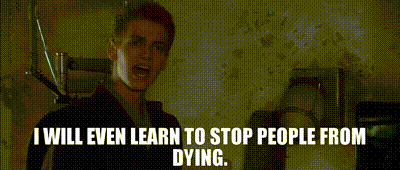
At the end of Ready Player Two Wade gains the ability to create artificially intelligent copies of the minds of the users. This is posited as a moral good. He calls this digital immortality. He calls this resurrection. It is a way to avoid “ever having to lose someone they love again.” This is a controversial theme to introduce at the end of a book, and Cline seems entirely unaware of the complexity of the situation that he has just proposed.
The technology is new, and many of the brains scanned have been scanned without the knowledge or consent of the user. Wade and his friends unilaterally make the decision to create sentient beings capable of thinking and feeling. They do this based on their own emotional needs without any consideration for whether or not the person being revived wishes to be revived. Please remember that these people are being revived into a world that a spiteful, idiot, child has complete godlike dominion over. Artemis creates a digital copy of her grandmother that is as capable of suffering as it is joy. Artemis does this so that she doesn’t have to endure the pain of her grandmother’s absence.
This is toxic escapism on the grandest scale. They are creating human life to assuage their own loneliness. This is different from parents creating children either by accident, or out of the desire to bring new life into the world. This is done out of the purely selfish desires to eternally preserve one’s own life, and to avoid ever having to mourn a loss. The moral implications are staggering and are the topic of many better books. I could write an entire separate essay on why this is a ghoulish nightmare scenario. That Cline takes this as an objective good is disappointing to say the least.
The reason I dislike Ready Player Two, and by extension all of Cline’s work is because of a fundamental and important moral difference between myself and the author. I think using media to escape from your problems is only marginally better than using a substance to escape from your problems. I don’t think it’s healthy to believe that the body is separate from the mind. I don’t think it’s healthy to believe that the world is not worth living in. Ernest Cline disagrees. Ernest Cline believes that the only rational response to the outside world is to try to escape from it.
We can fix writing style. We can fix the pacing. We can fix the characters. We can fix the world building. In fact, if there is ever a movie made of this, I’m sure that it will do just that. I am also sure that Ernest Cline won’t care that it changes the fundamental message and beliefs inherent in his story because he has never cared about creating anything. His integrity, his beliefs, his morals, these things do not matter to him. What matters to him is the fantasy. What matters to him is being on that movie set again, even if it looks nothing like his story. If it allows him to continue to play the role of John Hughes, then it will keep the dark thoughts at bay for a little while longer.
